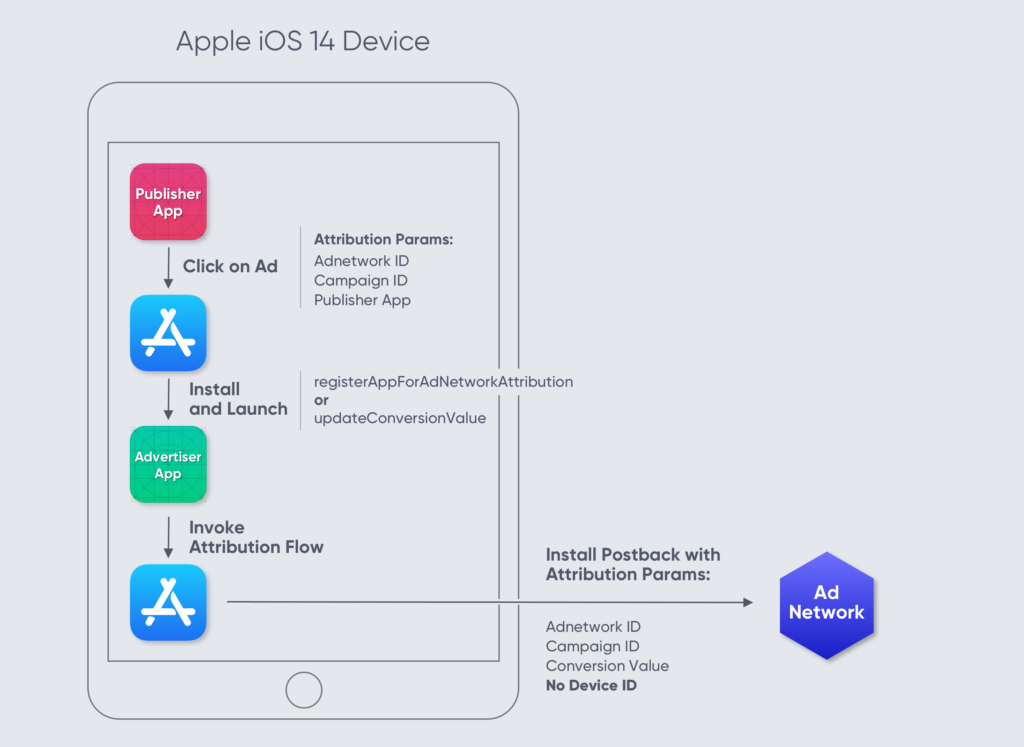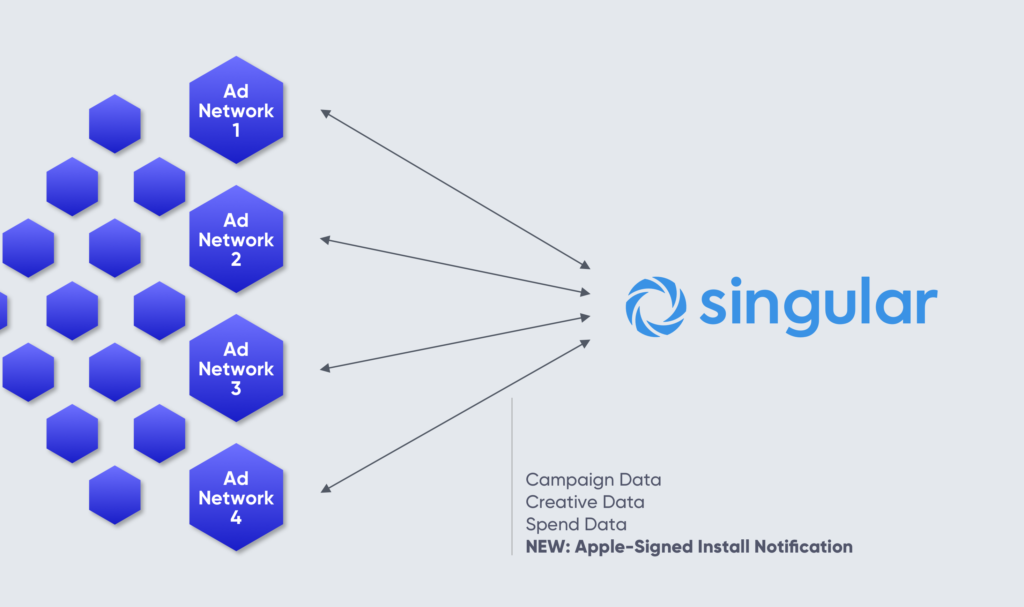Singular announces first-to-market SKAdNetwork support to replace the IDFA
For the past couple of years we’ve been preparing for the eventuality that Apple would deprecate the IDFA. What was once an unfathomable scenario will now become a reality this September when iOS 14 launches publicly.
While the IDFA isn’t completely gone, Apple created an opt-in mechanism that will effectively render it useless, and as a result, thousands of companies and millions of developers are scratching their heads and wondering what’s next.
We’ve given it a lot of thought here at Singular, as this fundamentally redefines the role of Mobile Measurement Partners (MMPs).
MMPs are designed to provide unbiased third-party measurement of your mobile marketing efforts. Up to now, much of that promise was facilitated with the aid of mobile ad identifiers like Apple’s IDFA on iOS and GAID (Google’s Advertising ID) for Android. Moving forward, we face a significant challenge: finding new ways to keep that promise and help marketers optimize their campaigns … while preserving end-user privacy. Even in the middle of massive market shifts like the one we’re going through now.
That is why I’m very excited to announce Singular’s first-to-market support for SKAdNetwork, making it scalable, simple, and seamless for mobile marketers.
Yesterday’s announcement at WWDC is a tectonic shift for mobile marketers. Some are probably wondering how they can optimize ad campaigns in the future. It will still be possible, and you will be able to understand which marketing inputs are driving the results you need.
Context: what is SKAdNetwork?
SKAdNetwork is a library provided as part of iOS to help marketers attribute marketing in a privacy-safe way.
Apple’s been working on it for some time. Thankfully, we’ve also been working on how to support it for over a year now. But in iOS 14, Apple has given SKAdNetwork some major renovations that made it a whole lot more useful and usable. And it definitely feels like Apple listened to us and other marketers in the Mobile Attribution Privacy Coalition who spent time analyzing its strengths and weaknesses.
The key concept in SKAdNetwork is that the iOS operating system will now play a central role in facilitating marketing attribution.
If SKAdNetwork is enabled in an app, the App Store will now receive attribution parameters when it’s opened due to a click on an ad. Then, if this click results in a conversion — an app download — iOS itself will send a postback accompanied by those attribution parameters.
(And, potentially, some important post-install conversion data, which we’ll cover later.)
This may sound somewhat similar to Google’s Play Referral mechanism, but what makes SKAdNetwork privacy-preserving is the fact that the attribution parameters cannot contain any device IDs or personally-identifying information. In addition, the install postback is sent by the operating system itself, and not by the installed app. As such advertisers will know that an install has happened, but they won’t be able to connect a specific install with a specific device, thus preserving privacy.
SKAdNetwork 1.0 was initially released over two years ago, and it offered very limited granularity plus no support for post-install measurements, making it practically unusable for optimization purposes.
The good news is that in SKAdNetwork 2.0, Apple added “publisher-app” granularity. In other words, marketers can now get data on which publisher drove which install. That’s critical: now we can provide publisher-level insights to marketers. In addition, Apple also added limited support for post-install tracking with their new updateConversionValue and registerAppForAdNetworkAttribution methods.
A high level flow looks like this:

What does this mean for marketers?
Currently, marketers have two main sources of data for measuring marketing campaigns:
- From MMPs: metrics on installs and post-install cohorted metrics
- From ad networks: metrics on impressions, clicks, video-views, spend
As things currently stand, Singular combines those two datasets together. Then marketers can get both granular and high-level insights on the results of their marketing investments. With those insights, they can optimize acquisition and retargeting campaigns, test new networks, and more.
With iOS 14, everything changes.
For starters, the data flow for mobile app attributions will change. Instead of apps sending postbacks to Singular, now Apple will be sending install postbacks to ad networks whose ads caused the app install. These postbacks include information about the install that is cryptographically signed by Apple, and can be verified using Apple’s public key.
Another key issue with iOS 14: measuring post-install activity. SKAdNetwork includes functionality for an app to send a small amount of post-install conversion data back to the ad networks, but this is limited in both scope and timing. (More details on this shortly in our next post.)
There’s a significant positive here, by the way. In iOS 14, Apple vouches for app installs, which dramatically reduces the likelihood of ad fraud.
All of this means major change for marketers. Whereas previously MMPs collected all the data they needed, now iOS advertisers will need to collect all install postbacks (and any post-install conversion data) from every ad network they run campaigns with. Plus, advertisers will need to validate these postbacks, store them, translate the attribution parameters to human readable data, and then connect it to campaign spend data to determine return on ad spend. Oh, and the closer you can do it real-time, the better you can be at optimizing your future ad spend.
That’s exactly where Singular comes in.
Singular’s solution: making SKAdNetwork simple and scalable

Singular is the leader in aggregating data from thousands of data sources. We collect more data from more sources in more ways than anyone else, which we then standardize, aggregate, and present. And that’s perfectly aligned with our MMP attribution product, which has gained incredible momentum in the last two years with many of the world’s best brands switching from legacy MMPs to Singular as a unified aggregation and attribution solution.
Our primary advantage as a platform becomes even stronger in this new SKAdNetwork reality.
We already are by far the best in the world in gathering full data sets from every single channel. After all, that’s our core strength. In supporting SKAdNetwork, we will be adding the role of collecting the various Apple-generated postbacks from all of your ad network partners. We’ll then verify them, de-dupe them, parse them, and connect them to your ad spend to report on ROI.
And Singular will still help you achieve publisher-level granularity for marketing reporting (what some in the industry have called sub-publisher granularity).
Plus, of course, the SKAdNetwork stack will have to work side by side with the existing MMP capabilities of the Singular stack, including continued support for:
- iOS fingerprinting (adhering to any Apple updates)
- iOS deeplink support (still fully supported)
- iOS deferred deeplink support (reliant on fingerprinting)
- Android attribution (yeah, apparently Android is kind of a big deal)
- Web and cross-device attribution (growing in importance)
- Spend and ROAS reporting (critical for marketing optimization)
SKAdNetwork is going to introduce new challenges and complexities. There’s no doubt about that. However, we commit to helping you navigate these challenges.
And we will ensure you have the ability to do your job … while preserving user privacy.
Interested in continuing the conversation? Join us and other industry experts in the Mobile Attribution Privacy (MAP) Coalition Slack group, to exchange ideas and ask questions.
Stay up to date on the latest happenings in digital marketing


